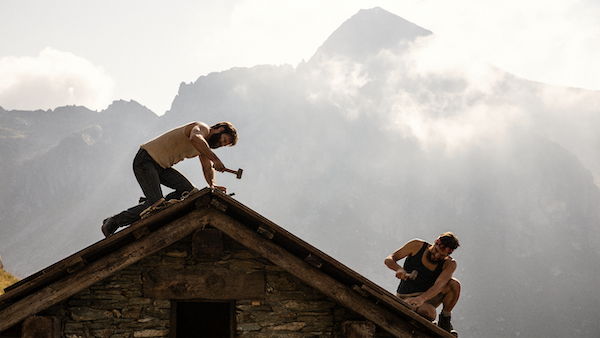
Based on a 2016 novel by Paolo Cognetti, The Eight Mountains is memorable more for what it shows than what it means. The novel, vivid descriptions of living and climbing in the mountains near the Aosta Valley alternating with observations about engineering, construction, love, and family, had similar issues. Like the movie, carefully assembled and less than the sum of its parts.
Cognetti is a talented writer, and his novel consistently engrossing. The same is true of the movie, despite problems with pacing. Written and directed by Felix van Groeningen and Charlotte Vandermeersch, The Eight Mountains pares down some characters, smooths out the novel’s timeline, and makes extremely good use of its Italian landscapes.
The plot follows two young boys: Pietro, from a middle-class Turin family, and Bruno, living with relatives in a dying mountain village. They are friends but also rivals for the attention of Pietro’s parents Giovanni (Filippo Timi) and Francesca (Elena Lietti). On the cusp of their teen years, Pietro makes a decision that will change Bruno’s life forever.
Years later, Pietro (Luca Marinelli) has abandoned his parents to work as a chef and aspiring writer. Bruno (Alessandro Borghi) remains a mountain man, working construction, reviving his uncle’s cheese-making alpeggio, marrying Pietro’s castoff girlfriend Lara (Elisabetta Mazzullo). The two friend reunite when Pietro’s father dies, leaving him a tumbledown shack on a remote mountain that the two rehabilitate.
Bruno runs into financial problems, Pietro finds a girlfriend in Nepal, the two fight and reconcile. That’s it until the ending, telegraphed by Pietro’s account of Buddhist “sky burials” in the Himalayas.
For me, an amateur hiker, the best part of The Eight Mountains was the cinematography by Ruben Impens, SBC. Few recent drama capture the struggle and exhilaration of mountain climbing as well as this one does. A sequence where Giovanni helps the two young boys up a glacier is terrifying and beautiful at the same time. Summits are breathtaking, as are Impens’ golden-hour landscapes. You can understand the mountains’ pull as well as their danger, and why characters can sit and stare at their surroundings for hours.
Less convincing are the interactions between Bruno and Pietro. Given that Pietro is a writer who records what he sees, it makes sense that he withholds his emotions. Bruno is equally stubborn, to the point where we suspect his intellect. But at nearly 150 minutes, there’s a lot of dead air between two non-communicative men.
The script especially shortchanges Giovanni’s character. In the book he is smart, loving, give great advice, and tries to do right by both boys. In the movie he is a grump who smokes too much. As a result, Pietro’s eventual understanding of his father’s true nature lacks the emotional punch it should have had.
Among other films, van Groeningen directed The Broken Circle Breakdown, a pretentious cancer drama set in the world of Flemish bluegrass music; and the truly miserable Beautiful Boy, a real-life suicide melodrama starring Steve Carell and Timothée Chalamet. They give you a glimpse of where The Eight Mountains is heading: gloom, despair, death in beautiful surroundings.
Screened as part of the “Spotlight” section at Sundance, and inexplicably winner of the Jury Prize at 2022’s Cannes Film Festival.
Credits: Directors: Felix van Groeningen, Charlotte Vandermeersch. Screenwriters: Felix van Groeningen, Charlotte Vandermeersch. Based on the book by Paolo Cognetti.Director of photography: Ruben Impens, SBC. Producers: Mario Gianani, Lorenzo Gangarossa. Starring Luca Marinelli, Alessandro Borghi, Filippo Timi, Elena Lietti.
Photo courtesy of Sundance Institute


